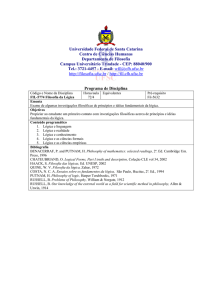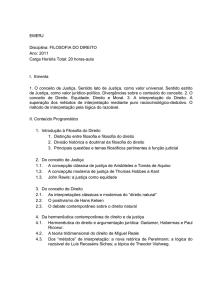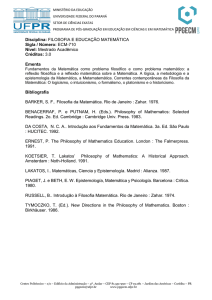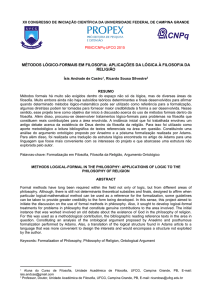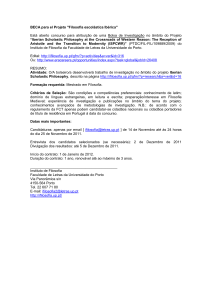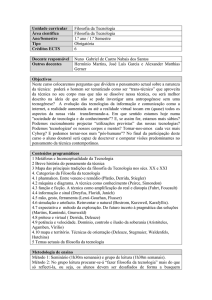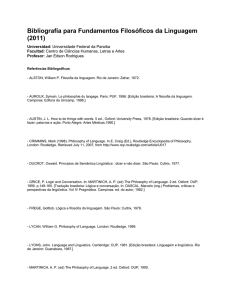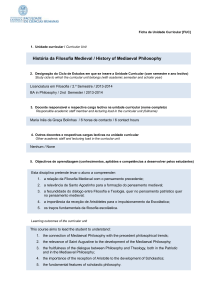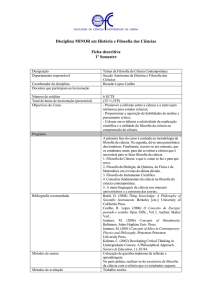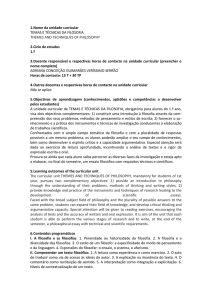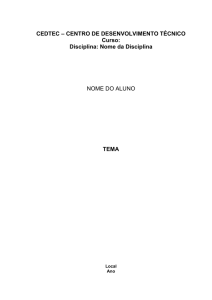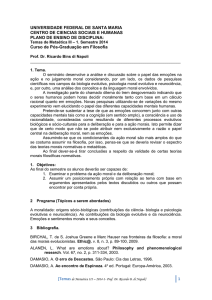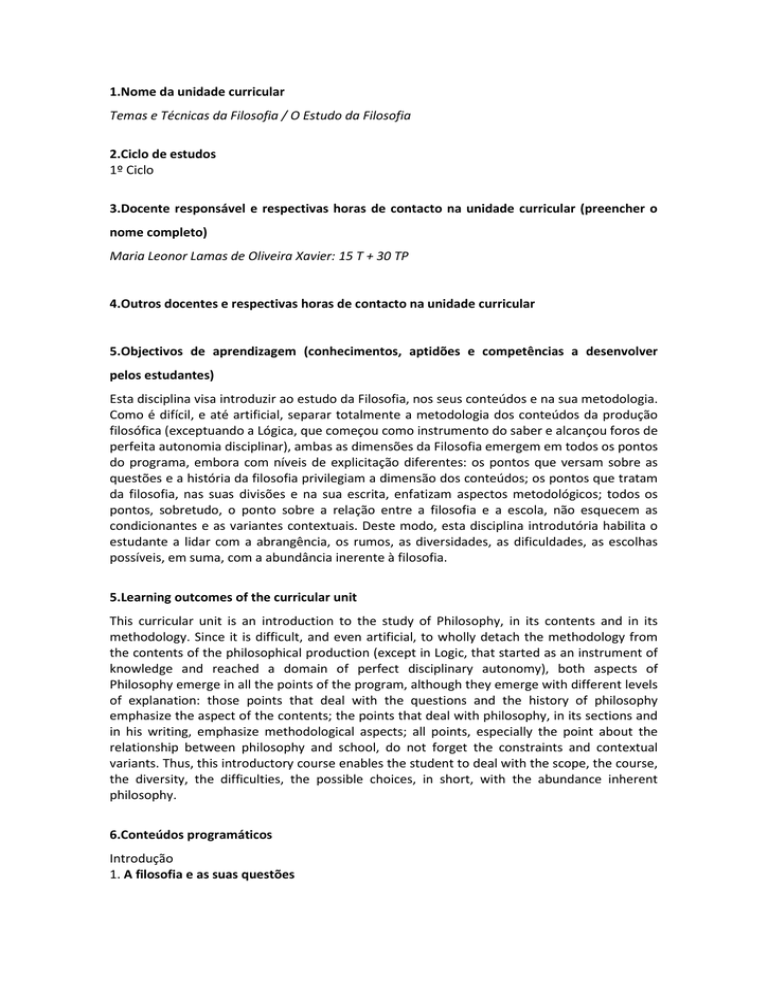
1.Nome da unidade curricular
Temas e Técnicas da Filosofia / O Estudo da Filosofia
2.Ciclo de estudos
1º Ciclo
3.Docente responsável e respectivas horas de contacto na unidade curricular (preencher o
nome completo)
Maria Leonor Lamas de Oliveira Xavier: 15 T + 30 TP
4.Outros docentes e respectivas horas de contacto na unidade curricular
5.Objectivos de aprendizagem (conhecimentos, aptidões e competências a desenvolver
pelos estudantes)
Esta disciplina visa introduzir ao estudo da Filosofia, nos seus conteúdos e na sua metodologia.
Como é difícil, e até artificial, separar totalmente a metodologia dos conteúdos da produção
filosófica (exceptuando a Lógica, que começou como instrumento do saber e alcançou foros de
perfeita autonomia disciplinar), ambas as dimensões da Filosofia emergem em todos os pontos
do programa, embora com níveis de explicitação diferentes: os pontos que versam sobre as
questões e a história da filosofia privilegiam a dimensão dos conteúdos; os pontos que tratam
da filosofia, nas suas divisões e na sua escrita, enfatizam aspectos metodológicos; todos os
pontos, sobretudo, o ponto sobre a relação entre a filosofia e a escola, não esquecem as
condicionantes e as variantes contextuais. Deste modo, esta disciplina introdutória habilita o
estudante a lidar com a abrangência, os rumos, as diversidades, as dificuldades, as escolhas
possíveis, em suma, com a abundância inerente à filosofia.
5.Learning outcomes of the curricular unit
This curricular unit is an introduction to the study of Philosophy, in its contents and in its
methodology. Since it is difficult, and even artificial, to wholly detach the methodology from
the contents of the philosophical production (except in Logic, that started as an instrument of
knowledge and reached a domain of perfect disciplinary autonomy), both aspects of
Philosophy emerge in all the points of the program, although they emerge with different levels
of explanation: those points that deal with the questions and the history of philosophy
emphasize the aspect of the contents; the points that deal with philosophy, in its sections and
in his writing, emphasize methodological aspects; all points, especially the point about the
relationship between philosophy and school, do not forget the constraints and contextual
variants. Thus, this introductory course enables the student to deal with the scope, the course,
the diversity, the difficulties, the possible choices, in short, with the abundance inherent
philosophy.
6.Conteúdos programáticos
Introdução
1. A filosofia e as suas questões
A formulação kantiana (KrV B 833): «1. Que posso saber? – 2. Que devo fazer? – 3. Que me é
permitido esperar?». – A centralidade do homem em questão. – Da questão antiga dos
princípios às questões filosóficas da actualidade: questões perenes e questões datadas.
2. A filosofia e as suas divisões
As disciplinas filosóficas: as divisões antigas da filosofia e os currículos dos cursos actuais de
filosofia. – A filosofia e as ciências. – A filosofia e as humanidades. – As filosofias: correntes,
tendências e famílias de pensamento.
3. A filosofia e a sua história
O valor da história da filosofia. – As grandes divisões da história da filosofia.
4. A filosofia e a escrita
A leitura e a interpretação de textos filosóficos. – A aprendizagem da escrita filosófica. – A
mediação de traduções. – As referências bibliográficas.
5. A filosofia e a escola
Uma relação profícua mas não exclusiva. – A filosofia na universidade. – A filosofia na
Universidade de Lisboa.
6.Syllabus
Introduction
1. Philosophy and its questions
The Kantian formulation: 1. What can I know? – 2. What ought I to do? – 3. What may I hope?
– The man’s centrality into question. – From the ancient question of the principles to actual
issues: perennial and dated questions.
2. Philosophy and its sections
The philosophical disciplines: the ancient sections of philosophy and the curricula of current
philosophy courses. – The philosophy and the sciences. – The philosophy and the humanities. –
The Philosophies: currents, trends and families of thought.
3. Philosophy and its history
The value of the history of philosophy. – The great sections of the history of philosophy.
4. Philosophy and writing
The reading and interpretation of philosophical texts. – The learning of philosophical writing. –
The mediation of translations. – References.
5. Philosophy and the school
A fruitful relationship but not an exclusive one. – The Philosophy at the University. – The
Philosophy in the University of Lisbon.
7.Demonstração da coerência dos conteúdos programáticos com os objectivos de
aprendizagem da unidade curricular
Os conteúdos programáticos dos pontos – 1. A filosofia e as suas questões, e 3. A filosofia e a
sua história – adequam-se ao objectivo de introduzir ao estudo dos grandes temas da filosofia.
Os conteúdos dos pontos – 2. A filosofia e as suas divisões, e 4. A filosofia e a sua escrita –
adequam-se ao objectivo de introduzir às metodologias de produção e desenvolvimento, de
análise e síntese, de interpretação e expressão, que são próprias da filosofia. O conteúdo do
ponto – 5. A filosofia e a escola – ajusta-se especialmente ao objectivo de considerar as
variantes contextuais, que condicionam a produção da filosofia. A satisfação destes objectivos
habilita o estudante a lidar com a abrangência, os rumos, as diversidades, as dificuldades, as
escolhas possíveis, que o estudo da filosofia envolve.
7.Demonstration of the syllabus coherence with the curricular unit's objectives
The programmatic contents of the points – 1. Philosophy and its questions, and 3. Philosophy
and its history – suit the purpose of introducing the study of the great issues of Philosophy.
The programmatic contents of the points – 2. Philosophy and its sections, and 4. Philosophy
and its writing – suit the purpose of introducing the methods of production and development,
analysis and synthesis, interpretation and expression, which are proper to Philosophy. The
content of the point – 5. Philosophy and the school – fits particularly the purpose of
considering the contextual variants that influence the production of philosophy. Meeting these
purposes enables the student to deal with the scope, the course, the diversity, the difficulties,
the possible choices, which involves the study of philosophy.
8.Metodologias de ensino (avaliação incluída)
O ensino da UC é teórico e teórico-prático, incluindo a exposição teórica de conteúdos
programáticos e uma forte componente prática, constituída por exercícios regulares de
apresentação oral de textos de uso lectivo.
Avaliação
A classificação final é a média das classificações obtidas nos dois seguintes elementos
obrigatórios:
1) Um trabalho escrito individual (7p.), previamente orientado, sobre uma das questões da
filosofia, discriminadas no ponto 1. do programa, e a partir de um dos textos escolhidos a
propósito.
Critérios de avaliação: clareza, organização e correcção da expressão escrita, com espírito
crítico.
2) Participação nos exercícios práticos na aula, incluindo um exercício de apresentação oral de
um texto de uso lectivo e um exercício de arguição de uma apresentação. Os textos são
escolhidos da colecção disponível de textos de uso lectivo, constituída a partir da bibliografia
do programa.
Critérios de avaliação: clareza, organização e correcção da expressão oral, com espírito crítico.
8.Teaching methodologies (including evaluation)
The teaching of this curricular unit is theoretical and practical. It includes the theoretical
presentation of the programmatic contents, and a strong practical component, consisting of
regular exercises of oral presentation of texts of academic use.
Evaluation
The final grade is the average of the grades obtained in the following two mandatory elements:
1) An individual paper (7p.), previously guided, on one of the questions of Philosophy, which are
detailed in section 1. of the program, and based on one of the texts chosen for that particular
purpose.
2) Participation in practical exercises in class, including an exercise in oral presentation of a text of
academic use, and an exercise in dispute of a presentation. Texts are chosen from the available
anthology of texts of academic use, constituted from the references of the program.
Evaluation criteria: clarity, organization and correction of the written and the oral expression,
with critical spirit.
9.Demonstração da coerência das metodologias de ensino com os objectivos de
aprendizagem da unidade curricular
A exposição teórica de conteúdos programáticos adequa-se ao objectivo de introduzir ao
estudo dos grandes temas da filosofia e às metodologias da sua produção e desenvolvimento.
A forte componente prática de apresentação oral regular de textos de uso lectivo adequa-se
ao objectivo de estimular nos estudantes o exercício de metodologias de interpretação e
expressão, que são próprias da filosofia.
O trabalho escrito individual adequa-se, em especial, ao objectivo de promover, na formação
dos estudantes, a relação directa com grandes temas e textos da filosofia, iniciando-os na
senda da investigação.
9.Demonstration of the coherence between the teaching methodologies and the learning
outcomes
The theoretical presentation of the programmatic contents suits the purpose of introducing to
the study of the great philosophical issues and to the methodologies of its production and
development.
The strong practical component of the regular oral presentation of texts of academic use suits
the purpose of encouraging students in the exercise of methodologies of interpretation and
expression, which are unique to philosophy.
The individual written paper suits, in particular, the purpose of promoting, in the formation of
students, the direct contact with major issues and texts of philosophy, guiding them in their
first steps on the path of research.
10.Bibliografia
PLATÃO, República I-V. – ARISTÓTELES, Metafísica I. – S. AGOSTINHO, Confissões VII-XI. – S.
BOAVENTURA, Itinerário da Mente para Deus. – T. MORUS, A Utopia (1518). – R. DESCARTES,
Discurso do Método (1637). – J. LOCKE, Carta sobre a Tolerância (1689). – I. KANT,
Fundamentação da Metafísica dos Costumes (1785); Crítica da Razão Pura ( 2ª ed., 1787). –
G.W.F., HEGEL, Introdução às Lições sobre História da Filosofia (1833). – H. BERGSON, A
Intuição Filosófica (1911). – B. RUSSELL, Os Problemas da Filosofia (1912). – L. WITTGENSTEIN,
Da certeza (1951) – M. HEIDEGGER, Que é uma coisa? (1962). – FOUCAULT, M., O que é um
autor? (1969). – P. RICOEUR, Do Texto à Acção (1986). – F. SAVATER, História da Filosofia sem
medo nem pavor (2009). – J. C. GONÇALVES, J., Itinerâncias da Escrita I (2011). – S. C. MATOS e
J. R. DO Ó (Coord.), A Universidade de Lisboa. Séculos XIX-XX. Vol. II (2013). – M. J. V. PINTO e
M. L. R. FERREIRA (Coord.), Ensinar Filosofia? O que dizem os Filósofos (2013).

